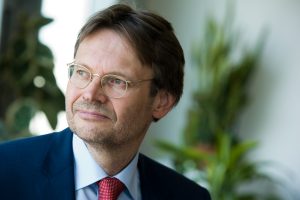The political, economic, social and cultural ties between our two countries are strong and intense and our billateral realtions are excellent. Croatia’s accession to the EU has added another layer to our already very strong relationship and made business interactions even easier.
More than 1,2 milion of Austrians come to Croatia every year and in a certain sense we consider Croatia as our neighbour even if we do not share common borders“, says H.E. Mr. ANDREAS WIEDENHOFF, Austrian Ambassador to Croatia in an interview for Diplomacy&Commerce magazine.
-
How much did Croatia’s accession to the EU contribute to further strengthening of what were already strong ties between the two countries?
Austria always has strongly supported Croatia’s accession to the EU. We have done this for a variety of reasons: First and foremost because we believe that Croatia should, naturally, become a member of this European family. Croatia is a country very much in the heart of Europe, geographically, culturally and historically. But since politics are always also interests-driven, it is only fair to say that it is in our interest, for instance in the interest of our investors, to have Croatia as a member of the EU. Doing business inside the EU is much easier than with a country outside the EU.
-
What are the priorities of the new Austrian government in regard to Croatia, and, generally speaking, this region?
If we look at the past 25 years in which Austria had governments composed of a range of coalition partners, we see that Croatia always had a very important place on the map for my country. It has always been a destination of choice for a huge (and increasing) number of Austrian holidaymakers and for Austrian investors.

-
In the light of the current European developments, in which political and economic issues can the two countries act as partners?
Both, Austria and Croatia are relatively small countries. This makes it potentially difficult to act in the European context because we need to deliver the same administrative output as the bigger Member States. Our comparative advantage, however, is that in both our countries communication lines are short: everybody knows everybody. This can be used to our advantage. Regarding a potential for cooperation I would say that, because of our geographical position on the European continent, we have a joint interest in the so-called Western Balkan countries becoming part of the European Union because these countries are relevant for us in the political field, when it comes to stability, and also in the economic field.
-
How much did the European integration process change Croatia for better, and what other things should the country change and develop?
Being a member of the European Union means that a country is taking part in a process. That process doesn’t stop at the moment a country joins the EU – on the contrary: that is the moment the real process starts. Being part of a process which transforms a country holds true for all the currently 28 Member States, whether they have joined the integration process early or just recently. We are all working towards a better Europe and for a better self.
-
In the past, you and other ambassadors were very clear about Croatia having to become more tolerant towards LGBT community, and more inclined towards media freedom. How current are these topics today, in your opinion, and do you think that there are new issues that Croatia should pay attention to?
This is linked to what I just said regarding the European Union. The EU is not only an economic superpower it is also, and probably above all, a space of shared values. These values have made us successful, including in the economic field. Being a member of the EU means working permanently for a more just, more tolerant, more free Europe. This is an effort every member State has to undertake, not only Croatia.

-
How many Austrian investors are operating in Croatia today, and which economic branches do they find the most appealing?
There are close to 700 investors present in Croatia. They have created more than 30.000 jobs here and they are active in all possible economic branches. Comptetition in the region is high and economic actors are geographically flexible. A country wanting to keep a foreign investor on its territory needs to work on its competitiveness and attractiveness because other countries that might be interesting to the said investor are doing the same. In the case of Austrian investors it is certainly Croatia´s easy accessibility as well as a familiar set of market economy rules that makes Croatia an intersting place for investments.
-
How satisfied are Austrian business people with the economic and business environment in Croatia, and, according to them, what can be improved?
Austrian investors are generally looking for predictability when it comes to tax standards and tax policies. They need a quick and efficient public administration with a low level of bureaucracy and last but not least, they want a justice system and court procedures that are predictable and do not take too much time. It is therefore important that the Croatian government keeps up its efforts when it comes to structural reforms and keeping Croatia on the map of interesting countries for foreign investors.
-
How strong of an influence does the Croatian diaspora and the community of Burgenland Croats have on shaping of cultural ties between the two countries?
According to the annual so-called Integration report, there are around 70.000 people living in Austria who consider themseleves as Croats. They have come to Austria either in the 1970s as Gastarbeiters or in the early 1990s as refugees during the war or at other moments, including recently, for instance as students. Many of them stayed on or will stay on and thus act as important bridge builders between the two countries. The same holds true for Austrians who are Burgenland Croats. They have been part of Austria’s linguistic and cultural diversity for several hundred years.
-
Before your appointment to Zagreb, you often visited Croatia as a tourist. How much did your taste in the favourite tourist destinations in Croatia change since your appointment? As an Ambassador you also go to places where tourists usually don’t go because these places are not considered as typical tourist destinations. However, also these more remote parts of Croatia offer a specific beauty which is often unexpected. What all parts of the country, from West to East and from North to South have in common is the kindness of the people